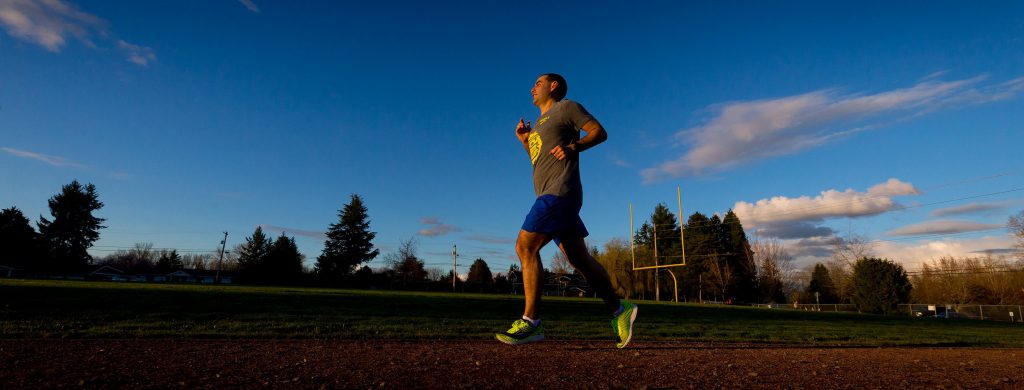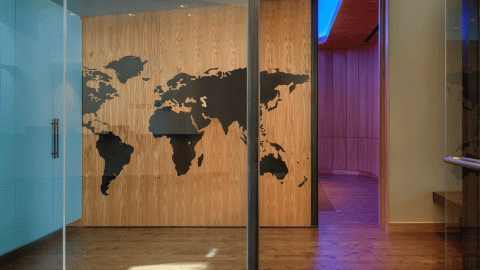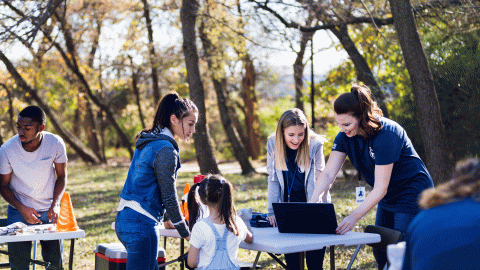‘He just took off’: Elite runner looks to Special Olympics, breaking his personal marathon record
The first clue that Andy Bryant would turn out to be an extraordinary runner revealed itself when he was 12.
His family planned to walk with him during his first organized 5K race because Bryant, like many people with autism, could be challenged by distractions. But when the starting bell went off, Bryant sprinted away — and out of sight. His slightly panicked mom and stepfather found him later at the finish line.
“We asked Andy if he was scared that he couldn’t see us, and he said no, he was fine,” says his mom, Colleen Engle. “He just took off, and we couldn’t catch him — and that gave us an indication that he had an aptitude for running.”
At 37, Bryant is now gearing up to participate in the 2018 Special Olympics USA Games, which will be held in Seattle for the first time. It is one of the largest sporting events the region has ever hosted. The games from July 1 – 6 will draw more than 4,000 athletes and coaches. The USA Games will showcase the talent, strength and determination of people with intellectual disabilities as they compete in Olympic-style events ranging from gymnastics and basketball to stand up paddle boarding and powerlifting.
Microsoft has teamed up with Special Olympics since 2014, when the two organizations launched a multi-year partnership to empower athletes of all abilities through technology. As the premiere partner of the USA Games, Microsoft is also recruiting employee volunteers and preparing to welcome tens of thousands of spectators to the region to celebrate inclusion and acceptance through sport.
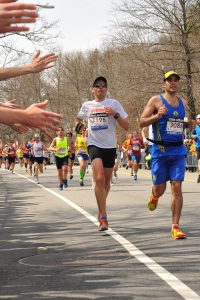
“Andy is a shining example of why Special Olympics are about so much more than sports. The entire Microsoft team is rooting for Andy and looks forward to cheering him on in July,” says Microsoft President Brad Smith, honorary chairman of this year’s games. “The 2018 Special Olympics USA Games are an important moment for Puget Sound as we team up with leading businesses and employers to create a region of inclusion where everyone has a role to play.”
Bryant, who lives in Woodinville, Washington, is an eight-time Boston Marathon qualifier and finisher, and an elite runner sponsored by Brooks Running. He works at Café 83 on Microsoft’s Redmond campus, a job he found three years ago through Microsoft’s Supported Employment Program that connects people with intellectual or developmental disabilities with jobs that match their interests and abilities.
With roughly 100 days to go until the USA Games, he is focused on a more immediate goal: breaking his personal record of 2:55:23 in his ninth trip to the Boston Marathon in April. That time, nearly 90 minutes faster than the average male marathoner, is an achievement no one would have foreseen had they listened to the doctors who diagnosed Bryant with autism spectrum disorder more than three decades ago. They told his parents that he would never be independent enough to cross the street by himself, let alone memorize the routes for 20-mile runs he now navigates on his own.
They said he would likely never read, let alone operate a smartwatch that lets him track his miles and pace and a smartphone that lets him text with his mom so she doesn’t worry when he’s training alone.
A series of supports in Bryant’s life — special education programs, parents who advocated for his inclusion in high school sports, teammates who stuck up for him in the face of unkindness, technologies that have enabled his independence — provided basic scaffolding for success. His innate abilities and affinity for running vaulted him into elite athlete territory.
“I like to have something I’m good at. It makes me feel confident and fast,” says Bryant.
But his mom isn’t sure any of it would have happened without Special Olympics.
“Special Olympics gives athletes like Andy the opportunity — under a kind of safe umbrella — to feel accomplished and celebrated, participate in team building, enjoy sports and learn to navigate risk,” Engle says. “Without it, I don’t think we would have expected him to do what he’s done or provided the environment and opportunities to explore his talent.
“Special Olympics told him, ‘yeah, you can.’ And then he knew — and we all knew — what he was capable of.”
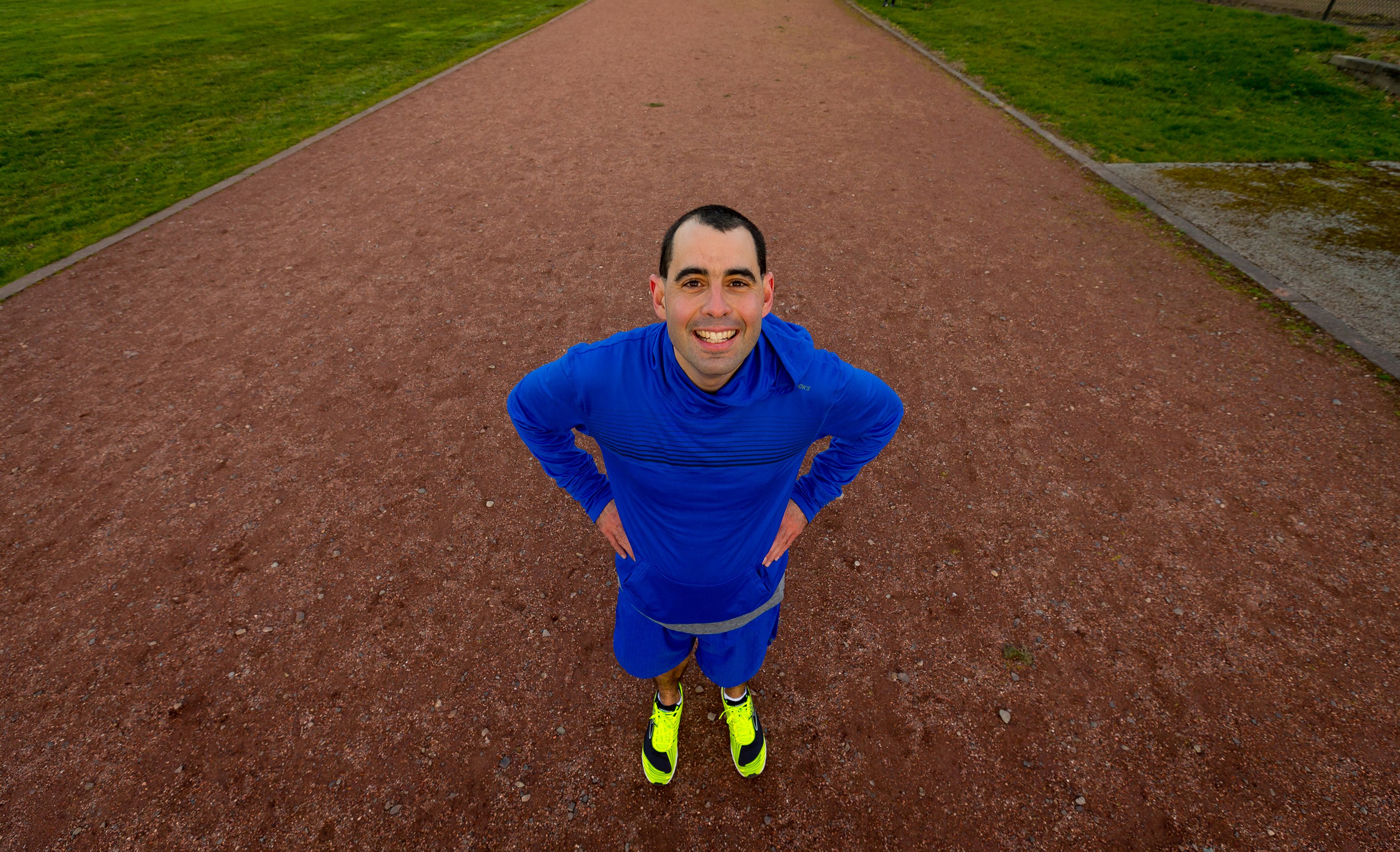
It was this shared mission of empowerment and inclusion that brought Microsoft and Special Olympics together in 2014, when Microsoft embarked on a partnership to support Special Olympics’ mission and overhaul technology systems that had become outdated. Moving its games management system to the cloud enabled the organization to transform how Special Olympics events are run and offer a better experience for athletes and fans.
“Andy is a shining example of why Special Olympics are about so much more than sports.” – Microsoft President Brad Smith, honorary chairman of the 2018 Special Olympics USA Games
Previously, volunteers sometimes had to write down times or scores on notecards and do data entry later, which meant athletes waited hours for official results and missed out on opportunities to celebrate or be recognized. After moving to Microsoft’s cloud-based Azure system, Special Olympics was able to deliver real-time results reporting, athletes could track personal bests and Microsoft Surfaces and other hardware enabled volunteers to enter data instantaneously during the 2015 World Summer Games and 2017 World Winter Games.
At the USA Games, Special Olympics will debut a new and more robust games management system, which Microsoft has supported and is hosting in Azure.
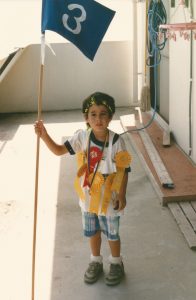
Bryant had his first experience with Special Olympics programs when he was five — an assisted walk race in Okinawa, Japan, where his father was stationed. He walked around a track once with two people on each side holding a hand to keep him from wandering — and got a medal for it.
“Special Olympics really facilitated the confidence he has now as a runner,” his mom Engle says. “When he started out, he did an event and got cheered and awarded for it, even though he had just barely made it around the track without getting distracted with two guides. And that was celebrated.”
In elementary school, he started downhill skiing through Special Olympics, which taught him a lot about managing fear and risk on his own terms. It also helped Bryant learn to focus, his mom said, because as soon as your attention waivers you’re prone to crashing.
Bryant’s stepdad Jerry Engle introduced him to running, and seeing his natural talent, advocated for his son to be included on high school track and cross country teams. Bryant found acceptance and inclusion from his teammates, who challenged anyone who questioned his place or abilities to see if they could beat him. It turned out that certain aspects of his autism were compatible, even helpful, for long distance training.
“The way many people with autism are wired is that there’s a real comfort level in routine,” Engle says. “If the coach said to run five miles, he would run five miles every time. He has a real work ethic that you can also see in his job at Microsoft — he’s into cleaning, so every table leg is going to shine. He brings that same ethic to his training.”
Bryant has now run 29 marathons and works out with three different running clubs to keep in shape for his next Boston race. He plans to run the 3,000-meter and 10,000-meter races in the USA Games, and the half marathon if it’s offered. Ed Haywood, a local Special Olympics distance coach for the Edmonds Independent team, has known Bryant for a decade and coached him since 2017.
“He has an enormous amount of talent and has a lot of drive,” Haywood says. “He will push himself extremely hard where most people tend to try to find an easier way out. Andy’s not into that — one of the challenges with Andy is to rein him back in and not let him push too hard.”
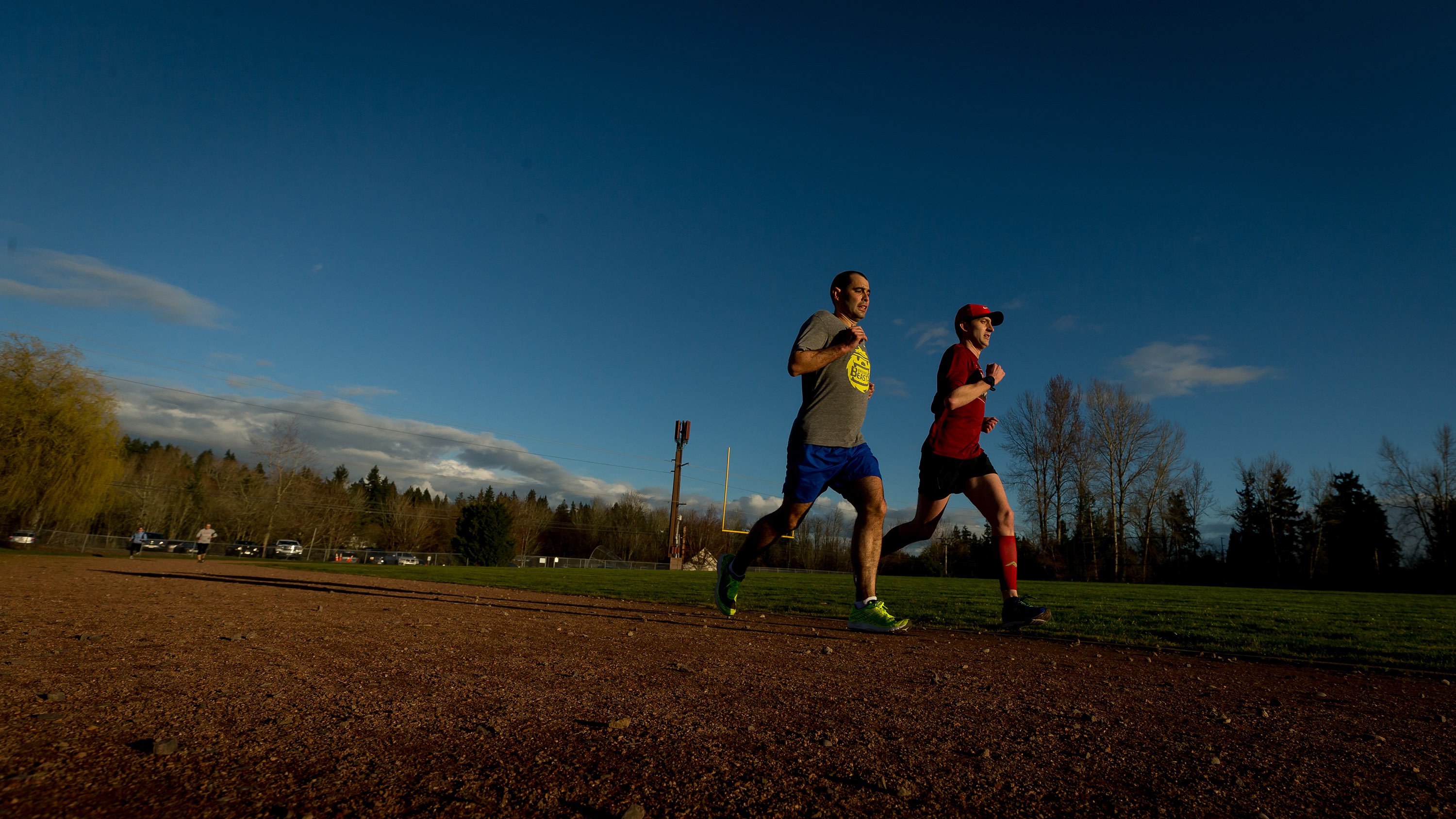
When asked what he likes most about running, Bryant has a few different answers. Watching the scenery go by. Feeling accomplished. Being part of a group. Going fast.
Running also offers opportunity for Bryant to regularly experience two sometimes opposing things that help define a happy adult’s life: independence and inclusion.
New technologies like smartphone-based running apps have radically increased his self-sufficiency, allowing him to stay in communication and others to track his route when he trains by himself. He no longer has to wait for his mom to join him on her bike or a coach to be free to take off on a 20-mile run. He takes the bus from his group home to the gym every morning, heads to work the lunch shift at Microsoft and can go out running in the neighborhood afterwards if he wants.
But running also offers the opportunity to be part of a clan — if you’re good enough to run the Boston Marathon nine times, other runners will respect you. Bryant has learned to talk marathon times and pace per mile with strangers at the starting line or with running club friends as they grind out long Sunday runs together.

“What’s interesting about Andy is that he has a foot in two worlds. Special Olympics allows Andy to really shine and meet and compete against people with similar communication and attention issues. So he feels like these are people like me, and that’s really important,” Engle says.
“But training and competing in marathons also gives him the rare opportunity to live in the non-impaired world,” she says. “If you’re someone with a disability and you can find an in to a world where you’re not perceived as disabled, that’s a real high. I think that is what feeds his running and keeps him motivated — that sense of belonging.”
Check out this link from Special Olympics on the many ways you can get involved, including purchasing tickets and volunteering: https://www.specialolympicsusagames.org/get-involved/

